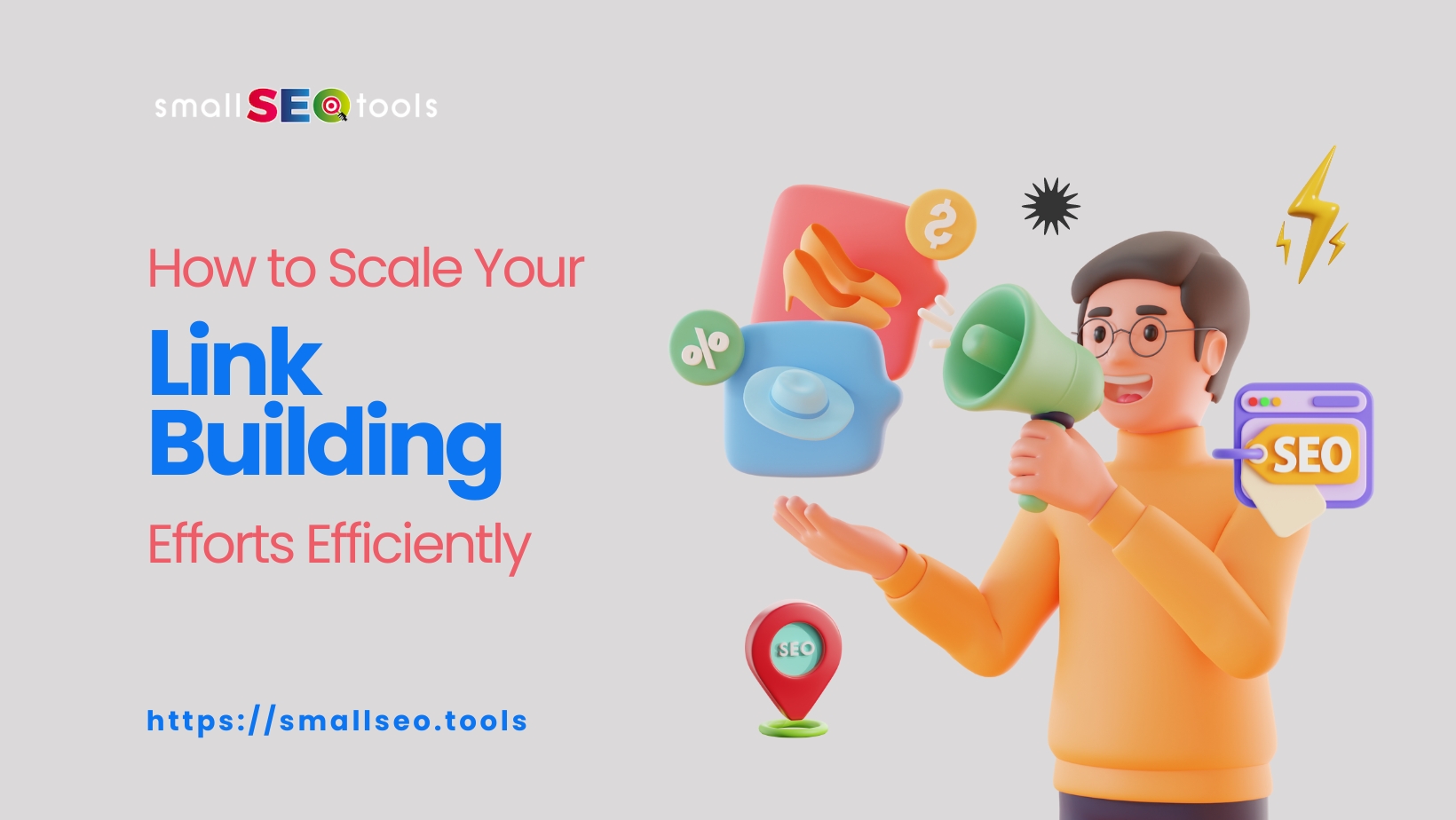How to Scale Your Link Building Efforts Efficiently
Growing a successful website takes time and effort. Just getting it off the ground and attracting initial visitors is a big first step. But sustaining traffic growth long-term requires scaling up your link building efforts.
Link building remains one of the most valuable SEO strategies for elevating a site's authority and rankings. Who doesn't want more high-quality backlinks directing searchers their way? However, not all link building is created equal. Simply churning out more links can be ineffective or even detrimental if not done properly.

The key is to scale up your link efforts efficiently. With the right framework and tactics, you can get links that deliver ROI without burning yourself out.
Start With a Strategic Framework
Too often folks dive right into tactics without aligning on strategy. That's a recipe for wasted time and poor results. Begin by defining key elements of your approach:
Objective
Are you aiming for overall domain authority gains? Higher rankings for key pages or posts? Increased referral traffic? Clarify what success looks like so you can focus efforts accordingly.
Targets
Identify relevant websites and publishers who are authoritative, trustworthy, and attract your ideal audience. Prioritize the sites that will deliver the most impact as sources of links.
Assets
Catalog your existing site content assets to determine what offers the most value for prospect link partners. Look for timely, in-demand topics and formats like data studies, how-tos, and listicles.
Outreach Strategy
Decide between a targeted, personalized outreach approach vs. a higher volume, automated approach. Resources can dictate strategy here.
Link Types
Consider which link types (guest posts, roundups, natural links, etc.) best align with your assets and publisher targets.
Tracking
Implement tracking to monitor key metrics like link acquisitions, referring domains, placements, and traffic driven. This helps gauge ROI.
With your strategy defined, you can then efficiently focus link building efforts.
Tactics for Efficiently Scaling Link Building
Executing a strategic framework requires choosing the right link building tactics for sustainable scaling. Here are impactful options to consider:

Leverage Software Tools
Third-party software can turbocharge research, outreach, and follow-ups. Tools like MeUP.com, Pitchbox, and Buzzstream offer different PR solutions and link-building features to boost productivity.
Create Evergreen Assets
Develop authoritative, universally relevant content not tied to fleeting trends. Evergreen assets have longer shelf lives for link prospecting. Guest posts, guides, and data studies make great evergreen fodder.
Recycle Top Content
Get more mileage from your best performing assets by repurposing them. Turn existing posts into visual assets for social media. Or reframe for different audiences by tweaking titles and intros.
Optimize for User Experience
Great content only earns links when people actually find and engage with it. Strong SEO optimization and compelling design are musts.
Diversify Publisher Domains
Vary the types of websites you aim to get links from—news outlets, individual blogs, directories, etc. This expands relevance and mitigates over-reliance on specific sites.
Build Relationships
Personal outreach, social follow-ups, and networking via conferences or events cultivate mutually beneficial publisher relationships. Links driven by relationships typically deliver more value.
Show Appreciation
Find ways to show your gratitude when you earn great links, such as sharing on social media or sending a brief thank you note. Appreciation breeds enduring partnerships.
Monitor the Competition
Research where competitors are getting featured links and identify those publishers as prospects. Sites linking to rivals may be receptive to your quality content too.
Consistency and persistence are still required long-term. But employing tactics like these allow you to work smarter, not just harder.
Scaling Outreach With Care
More link outreach isn't automatically better. Thoughtless scaling can backfire through poor-quality links or publisher burnout. Scale gradually while maintaining standards.

Prioritize Relevance
Resist blind outreach. Target sites where your content offers obvious value for readers and aligns editorially. Stretching for tangentially related or irrelevant links wastes everyone's time.
Quality Over Quantity
A few authoritative, strategically placed links can deliver greater ROI than a high volume of minor links from obscure sites. Stay focused on your prime publisher targets.
Avoid Over-Automation
While automation software can be hugely helpful, don't forfeit all personalization. The most fruitful publisher relationships require some degree of direct interaction. Find the right balance.
Monitor Link Profile
Use analytics to regularly assess your overall link profile as you scale efforts. Watch for any worrying patterns like an influx of low-quality links or over-optimization risks.
Show Appreciation
Gratitude goes a long way. Thank publishers who provide great links. Avoid a transactional mindset.
Link Building Journey - Tips for Steady Growth
Link building takes time. Don't get discouraged if you don't see immediate results from your efforts. The high-quality links you gain will gradually accumulate over the months to positively impact your site's authority and rankings. Keep nurturing relationships with publishers and regularly developing outstanding assets that attract links naturally.
Some additional tactics that can supplement traditional outbound link building include:
-
Publishing guest articles on your own site to attract inbound links. Offer unique data studies, insights, or expertise that publishers will want to cite.
-
Conducting giveaways or contests to incentivize links and social shares.
-
Securing branded anchor text links, like compelling company name mentions on relevant sites.
-
Participating actively in community forums and niche networking groups to build awareness.
Conclusion
The right link building framework paired with efficient tactics will allow you to scale your efforts sustainably over time. As you monitor analytics and continue providing value to publishers and their audiences, you will see the SEO results compound month after month. With persistence and creativity, your site can ascend to become an authority in its niche.
leave a comment
Please post your comments here.SEARCH
-
Popular SEO Tools
- Paraphrasing Tool
- Plagiarism Checker
- Article Spinner / Rewriter
- Keyword Position Checker
- Grammar Check
- Domain Authority Checker
- Pagespeed Insights Checker
- Reverse Image Search
- Page Authority checker
- Backlink Checker
- Alexa Rank Checker
- Backlink Maker
- Domain Age Checker
- Website Ping Tool
- Website Seo Score Checker
- Keyword Density Checker
- Website Page Size Checker
- Word Count Checker
- Mozrank Checker

 ™
™